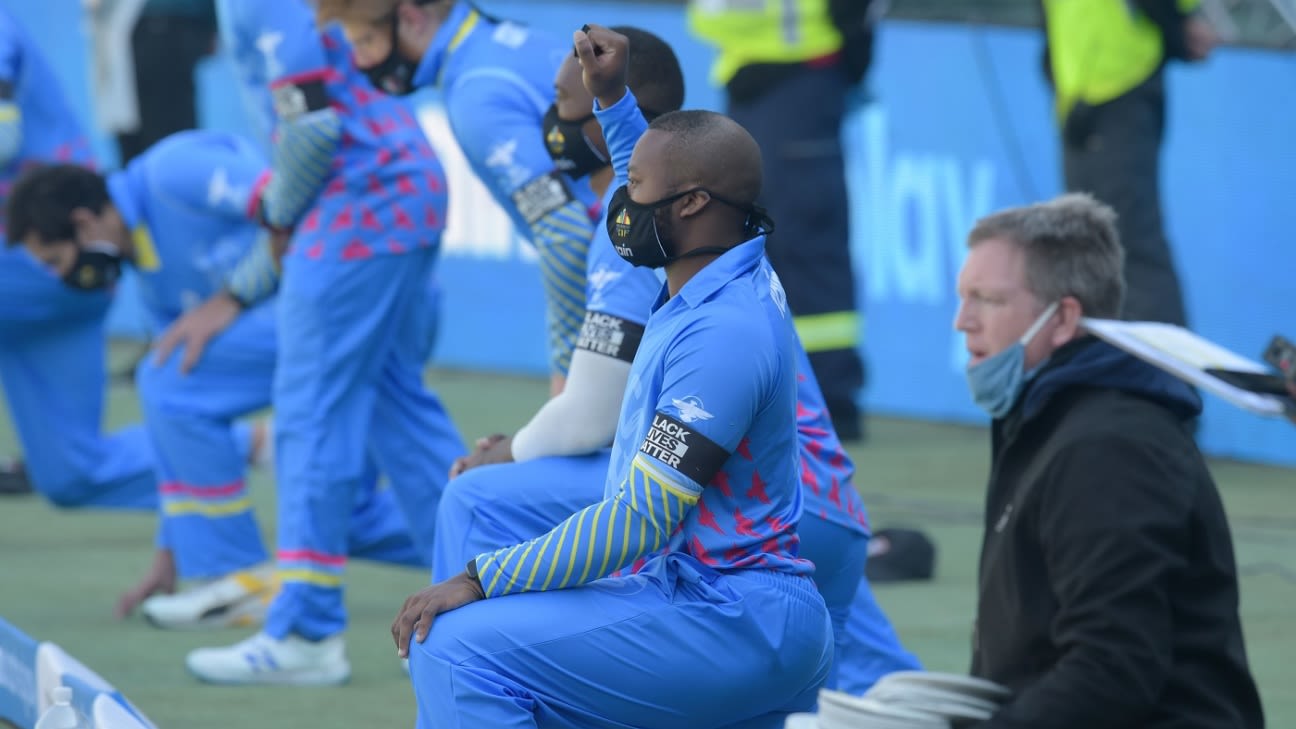South Africa will not take a knee on their first appearance as a national side since March, believing that they have already made their gesture of support for the Black Lives Matter (BLM) movement during the 3TC game in July.
Then, 24 players and all support staff including director of cricket Graeme Smith wore black arm-bands and took a knee before the start of play following weeks of polarised rhetoric and racial debate which threatened to tear the game apart. But, for the England series, players will consider wearing a black armband in a show of solidarity with the fight against gender-based violence and in memory of the victims of Covid19, in line with a call made by South Africa’s president Cyril Ramaphosa to declare November 25-29 national days of mourning. Flags around the country, and at Newlands and Boland Park, will fly at half-mast and the BLM discussion appears to have been put to rest.
“I have spoken to the guy (Lungi Ngidi) who was driving the whole movement within our set-up, he is pretty happy that we have done what we needed to do, in particular at that (3TC) game,” Mark Boucher, South Africa’s coach, who was not at the 3TC match because he had contracted the coronavirus at the time, said. “There are a couple of other issues that our president has raised going forward with regards to gender-based violence and the victims of Covid19. We are going to be addressing this with the team so if there is a black armband to wear, we will probably be wearing it because of the president’s call.”
Ngidi sparked the South Africa’s response to the BLM movement when he answered a question at a media briefing in which he was asked what he would like to see his team-mates do. He said he hoped the South African team would join the rest of the world in “making a stand”. Four former white cricketers disagreed with Ngidi, prompting 31 former players of colour and five current coaches (among them Hashim Amla, Makhaya Ntini and Herschelle Gibbs) throwing their weight behind Ngidi. In a few fraught winter weeks, players of colour shared their stories of exclusion and CSA set up a Social Justice and Nation-Building committee, which is looking into reparations for those who have been unfairly treated. The current crop of players addressed issues of race at a team building camp in the Kruger National Park in August and their stance, as its stands now, is that they need to embody values of inclusion rather than simply gesture them, by, for example, taking a knee.
“It’s not something that we have to continue to show. It’s something that you have to live… If guys who brought it up are happy with it, that’s great, but if they feel we have to do more, that will be a chat and that they are open to express their opinions.”
MARK BOUCHER
“It’s an ongoing thing for us,” Boucher said. “It’s not something that we have to continue to show. It’s something that you have to live. That is exactly what we are trying to doing our dressing room at the moment with a big squad. If guys who brought it up are happy with it, that’s great, but if they feel we have to do more, that will be a chat and that they are open to express their opinions. Our new value system is about respect, empathy and belonging and all of those lead to an environment where guys feel free to talk about these hard issues. They’ve got the support and respect and empathy from every other player.”
South Africa’s decision will, nonetheless, be scrutinised, especially given the country’s history of racial discrimination, and because several other sporting teams continue to find ways to outwardly show their support. Players in the English Premier League take a knee before the kick off of each match and the Australian cricket team have made known their intention to form a barefoot circle in acknowledgement of Aboriginal Australia before every series they play. Australia are due to tour South Africa at the end of the summer next March and could potentially show their gesture of inclusion on the same South African cricket grounds that people of colour were not allowed on as recently as 30 years ago, with the South African team watching from the sidelines.
For now, it’s England, who wore BLM armbands and took a knee throughout their series against West Indies and Ireland (but not against Pakistan and Australia) that South Africa face and issues where issues of systemic injustice continue to crop up. On Wednesday, umpires John Holder and Ismail Dawood called for an enquiry to look into the lack of diversity at the ECB, but Moeen Ali claimed he has never experienced racism in his time with England cricket. An investigation into racism at Yorkshire is also ongoing.
